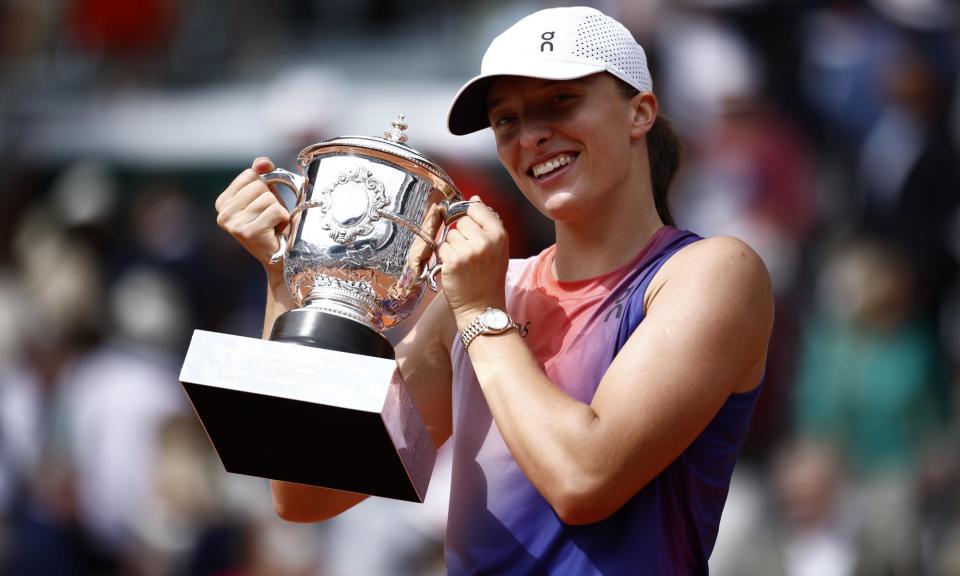Iga Swiatek eases past Jasmine Paolini to win third consecutive French Open

In the aftermath of Iga Swiatek’s first grand slam triumph at the Covid-ravaged French Open in the autumn of 2020, one of her primary emotions was confusion. Her victory had been so unexpected, and the subsequent rush of attention so overwhelming, that it left her with many doubts. She had to prove to herself more than anyone else that her maiden win was not a fluke and that she could establish herself as a champion on a consistent basis.
It is fair to say she has done a decent job. Swiatek continued her era of total, relentless dominance here on Saturday as she completely overwhelmed Jasmine Paolini despite the Italian’s gutsy start, closing out her third consecutive French Open title and fourth overall with an easy 6-2, 6-1 win in 68 minutes.
Related: Iga Swiatek beats Jasmine Paolini to retain French Open women’s title – live reaction
“It was an emotional win, because I felt a lot of stress yesterday and today in the morning,” said Swiatek. “I knew if I’m going to just focus on tennis I can fight through it and at the end it all went how I wanted. So I just felt really proud of myself.”
With another title, the world No 1 continues to stake her claim as a potential great and one of the most successful clay-court players of all time. The records are endless: at 23 years old she is the youngest woman to win a fourth French Open title, two years younger than the previous youngest, Justine Henin. Her record is 35-2 (95%) at Roland Garros and 84-10 (89%) on clay. Somehow, this still feels like the beginning of her story in Paris.
Paolini described facing Swiatek at this venue as the toughest thing in tennis. “To play her here, it’s something different,” she said. “She won already four titles, and she’s still [23] years old. These numbers are not normal, they are something unbelievable. I think she’s an unbelievable player.”
This victory also marks a shift in the overall record books. With five grand slam titles, Swiatek now owns the most majors among regularly active players – the seven-time champion Venus Williams plays only occasionally – and she moves level with Maria Sharapova and Martina Hingis on total grand slam titles in the open era.
While four of her titles have come on clay in Paris, Swiatek has won 12 of her 22 career titles on hard courts and she has enjoyed her 106 weeks at No 1. It is only a matter of time before she adds to her count elsewhere.
Before her irresistible run through the second week, Swiatek had been one point from defeat against a resurgent Naomi Osaka in their instant classic second-round match, which Swiatek won 7-6(1), 1-6, 7-5 after trailing 2-5, 0-30 in the final set. She joins a select list of players who have won a major title after facing match point.
While warming down after her narrow escape, Swiatek cried hard in the gym as the stress and tension escaped her. Then she composed herself, set her sights on the rest of the field and never looked back. Although Osaka won 17 games against Swiatek, the Pole’s other six opponents won 20 games combined.
Swiatek said that recovering to win the tournament from such a position has imbued her with the feeling she should always believe in herself and she can always find her tennis, regardless of the circumstances.
“I’ll always try my best no matter what the score is. Sometimes it’s going to add up like that, sometimes I’m going to lose. But when you’re trying your best, it’s always the best solution, because you have no regrets and you can turn tournaments into something like that,” she said, pointing at her trophy.
In by far the biggest occasion of her blossoming career, Paolini was initially determined to remain on top of the baseline, attacking with her heavy forehand and trying to put Swiatek under pressure. At times, she practically threw herself forward while trying to meet the ball on the rise and take the first strike in the point. She immediately settled down by breaking for a 2-1 lead.
Those positive moments did not last very long. The problem for Paolini is that Swiatek performs almost every facet of her game at a higher level. Paolini’s excellent topspin forehand guided her to a first major final, but Swiatek’s forehand is even heavier and more vicious. She is also a greater athlete and returner, armed with a much better backhand and serve.
In the very next service game, Swiatek eviscerated her diminutive opponent’s feeble serve and easily retrieved the break. It would set the tone for how she handled it throughout the match.
“I tried to play my best, but it’s not easy to play at that intensity,” said Paolini. “I never played a player that has this intensity before in my life.”
While another opponent was left with no choice but to force themselves far out of their comfort zone against her, Swiatek was completely at ease. She flattened Paolini’s serve, her own improved serve continued to generate free points and she worked the Italian off the court, dominating the rallies. After trailing 1-2, Swiatek bulldozed through 10 games in a row before serving out another title.
As Swiatek lifted her trophy, the great Chris Evert stood beside her on the podium. Evert has been the women’s record holder here since 1986 with seven titles. By the time Swiatek’s career is over, there is a chance that may no longer be the case.

